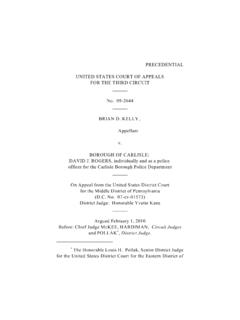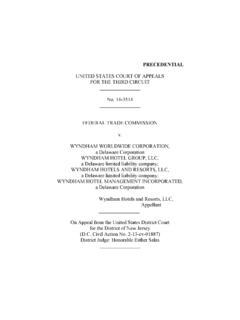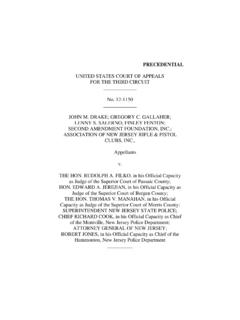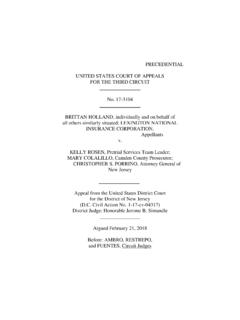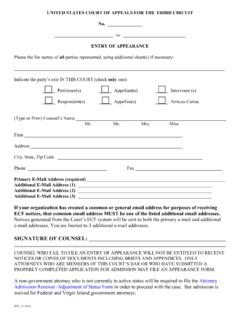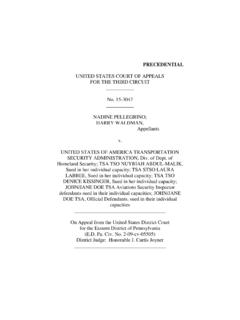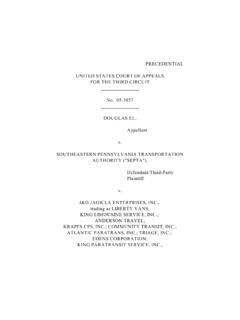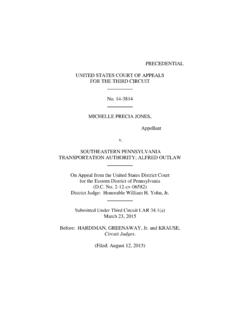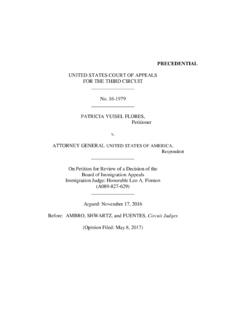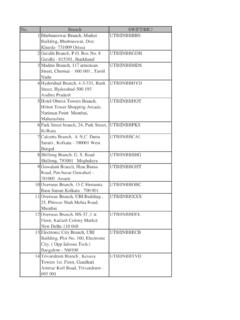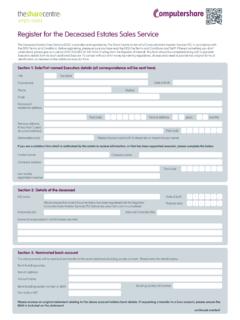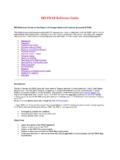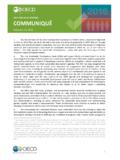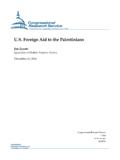Transcription of PRECEDENTIAL UNITED STATES COURT OF APPEALS FOR THE …
1 PRECEDENTIAL UNITED STATES COURT OF APPEALS FOR THE THIRD CIRCUIT _____ No. 13-1237 _____ IN RE: GRAND JURY SUBPOENA _____ On Appeal from the UNITED STATES District COURT for the Eastern District of Pennsylvania ( Pa. No. 2-10-gj-00127-002) District Judge: Honorable Gene E. K. Pratter _____ Argued September 25, 2013 Before: AMBRO, FISHER and HARDIMAN, Circuit Judges. (Filed: February 12, 2014) Ian M. Comisky (ARGUED) Matthew D. Lee Blank Rome 130 North 18th Street One Logan Square Philadelphia, PA 19103 Stephen R. LaCheen (ARGUED) LaCheen Wittels & Greenberg 1429 Walnut Street, Suite 1301 Philadelphia, PA 19102 Counsel for Appellant, John Doe Michelle Morgan (ARGUED) Peter F. Schenck Office of UNITED STATES Attorney 615 Chestnut Street, Suite 1250 Philadelphia, PA 19106 Counsel for Appellee, UNITED STATES 2 _____ OPINION OF THE COURT _____ FISHER, Circuit Judge.
2 Corporation and Client (together, Intervenors ) are targets of an ongoing grand jury investigation into alleged violations of the Foreign Corrupt Practices Act ( FCPA ). The grand jury served a subpoena on Intervenors former attorney ( Attorney ) and the Government moved to enforce this subpoena and compel Attorney s testimony, based upon the crime-fraud exception to the attorney-client privilege. Intervenors sought to quash the subpoena by asserting the attorney-client privilege and work product protection. After questioning Attorney in camera, the District COURT found that the crime-fraud exception applied and compelled Attorney to testify before the grand jury. Intervenors appeal, challenging the District COURT s decision to conduct an in camera examination, the procedures it fashioned for the examination, and the COURT s ultimate finding that the crime-fraud exception applies.
3 We hold that the standard announced in UNITED STATES v. Zolin, 491 554, 572 (1989), applies to determine whether to conduct an in camera examination of a witness. We also find that the District COURT did not abuse its discretion in applying this standard, in determining procedures for the examination, or in ultimately finding that the crime-fraud exception applies. We therefore affirm the District COURT s order enforcing the grand jury subpoena. 3 I. A. This matter is before us in the context of an ongoing grand jury investigation. To maintain confidentiality, we will refer only to the facts that have been made public and will refer to those involved as Corporation, Client, and Attorney in order to maintain their anonymity.
4 We also note that we and the District COURT had access to information pertaining to the alleged criminal violations via the Government s Ex Parte Affidavit, which set forth the basis for the Government s belief that the Intervenors committed FCPA violations. Intervenors were not apprised of this information. Additionally, we were informed by Attorney s account of the communications at issue, which were divulged to the District COURT during the in camera examination. Neither the Government nor the Intervenors were privy to this account. As such, we are hampered in our ability to articulate the background information underlying our conclusions. Intervenors are the targets of an ongoing grand jury investigation in the Eastern District of Pennsylvania seeking to determine whether they made corrupt payments to obtain business in violation of the FCPA.
5 Corporation is a consulting firm headquartered in Pennsylvania and Client is Corporation s President and Managing Director. The grand jury investigation stems from Intervenors business transactions with a financial institution ( the bank ) headquartered in the UNITED Kingdom and owned by a number of foreign countries. Between 2007 and 2009, Corporation was retained as a financial advisor by five companies to provide assistance in obtaining financing from the bank for 4 oil and gas projects. Two of the five projects were approved and financed by the bank , resulting in the payment of nearly $8 million in success fees to Corporation. For all five projects, Banker, an official and banker at the bank , was the operation leader responsible for overseeing the financing process.
6 In 2008 and 2009, Corporation made payments totaling more than $ million to Banker s sister. The payments occurred within months of the success-fee payments to Corporation. No evidence showed that Banker s sister worked on or was involved in any of the projects or meaningfully contributed to any of Corporation s other ventures. Attorney worked out of Corporation s office but practiced law independently. In exchange for permitting Attorney to work out of the office rent-free, Client would periodically consult Attorney on ordinary legal matters. Attorney had several brief interactions with Client regarding one of the successful financing projects. In April 2008, Client approached Attorney to discuss issues he was having with the project.
7 Client explained that he planned on paying Banker in order to ensure that the project progressed swiftly, as Banker was threatening to slow down the approval process. Attorney did some preliminary research, found the FCPA, and asked Client whether the bank was a government entity and whether Banker was a government official. Although Attorney could not ascertain given his limited research whether the planned action was legal or illegal, he advised Client not to make the payment. Despite this advice, Client insisted that his proposed payment did not violate the FCPA, and informed Attorney that he 5 would go ahead with the payment. Attorney gave Client a copy of the FCPA. After this communication, Attorney and Client ended their In February of 2010, the bank began an internal investigation into the transactions between Intervenors and Banker s sister.
8 The Overseas Anti-Corruption Unit ( the Unit ) in the UNITED Kingdom was informed of the situation, and the Unit informed the Federal Bureau of Investigation ( FBI ). The Unit arrested Banker and Banker s sister in the UNITED Kingdom; their prosecution is ongoing. The FBI began its investigation into Intervenors in February 2010. Due to the parallel prosecution of Banker and Banker s sister in the UNITED Kingdom, Intervenors have some knowledge of the nature of the grand jury investigation of which they are subjects. B. The grand jury served Attorney with a subpoena. On June 18, 2012, the Government moved to enforce the subpoena, seeking an order directing Attorney to appear and testify before the grand jury.
9 On September 4, 2012, Corporation and Client moved to intervene, and the District COURT granted this request. After briefing, the District COURT determined that it would conduct an in camera examination of Attorney outside the presence of Intervenors and the Government to determine the applicability of the crime-fraud exception to the communications between Attorney and Client. The 1 We recognize that even this vague recitation of the communications between Attorney and Client would ordinarily be covered by the attorney-client privilege. We reveal this account of the communications only because we have found that the crime-fraud exception applies.
10 6 District COURT invited Intervenors and the Government to submit questions for the District COURT to ask Attorney, which both did. On January 8, 2013, the District COURT questioned Attorney in camera, with only Attorney s own counsel present. After this examination, Intervenors requested that the District COURT release a transcript of Attorney s testimony so that they could argue that the communications were not subject to the crime-fraud exception. On January 18, 2012, the District COURT issued a memorandum and order granting the Government s motion to enforce the subpoena and directing Attorney to testify before the grand jury. Based upon its review of the Government s Ex Parte Affidavit and Attorney s in camera testimony, the District COURT found a reasonable basis to suspect that Intervenors intended to commit a crime when Client consulted Attorney and could have used the information gleaned from the consultation in furtherance of the crime.
